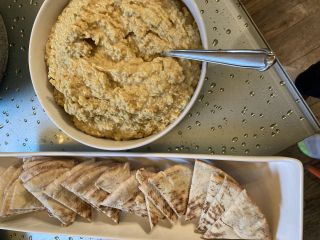Career
Working It Out to Have It Work Out
Is making hummus about, hmmmm, us?
Posted May 16, 2023 Reviewed by Gary Drevitch
Key points
- Sometimes to move forward we have to let things go.
- Mutuality in overall healthy relationships can allow us to work through issues.
- Our view of relationship glitches can be critical for mutuality in overall healthy relationships.
It’s the end of the work week and deadlines are piling up quickly, making it hard to get out from under seemingly unstoppable demands. As I move through the list, all suddenly freezes. I click and click again. Nothing. The Internet is frozen. Solid.
“No!” I shout to myself. “No! No! No!”
I push down on the keyboard multiple times. Nothing. The stolid screen seems to mock me.
An idea emerges amidst my desperation: Our hotspot. The solution for this modern day crisis. I run into the kitchen to find it.
“Oh no, Oh no, Oh no!” My husband Julian has not charged the hotspot. Again. Yikes. I have an online meeting in 20 minutes.
I’m stressed and upset. I call Julian. “Sweetheart, the Internet isn’t working and you didn’t charge the hotspot. Haven’t we had this conversation before, like a million times?”
I don’t hear Julian’s response. There’s no time. I have to get off the phone and figure out how to get into that meeting. Frustration consumes me. At the last moment, the hotspot charges and I’m welcomed into the meeting, only 3 minutes late. Phew!
That night, Julian and I talk. I explain how this is an ongoing issue we had revisited before, more than once.
Julian looks at the floor. “I’ll call the Internet provider,” he says. “This shouldn’t still be happening. I’m sorry about forgetting to charge the device.” My being softens. He’s trying to meet my concern, to take a step forward into the frustrated space I’ve been occupying.
Since this is a blog posting about mutuality in relationships (and here I am excluding relationships where it’s actually important to leave, such as abusive or controlling relationships), I get up the courage to ask Julian how perhaps I might have frustrated him this past week.
“Well, I don’t know,” Julian says with his English accent. “I don’t want to get in trouble.”
He spills the truth when I say it’s for my blog and I need the scoop to write it.
“Well, I was a bit frustrated when you and your friends came to the restaurant on Monday. I thought you were just coming by for drinks before the concert, but you ended up staying for dinner and we hadn’t even talked about it.”
“You are so right,” I exclaim. “I just assumed it was OK. And thanks for making dinner amazing, despite my not checking in.”
Mutuality in relationships is about give-and-take—the balance that needs to happen when we give to our partners and forgive to our partners. Mutuality offers us a way to move through the daily challenges of being fallible human beings, to get to the other side of our mistakes.
And sometimes to move forward, we have to let things go. To say, “It’s OK he forgot to charge the hotspot because, guess what? Just three days from now, I’m going to forget to communicate about having dinner at the restaurant.”
Reframing a situation helps us view it in different ways. Boiling chickpeas for our hummus recipe provides a perfect example. When the chickpeas are cooked in boiling water, a combination of proteins, carbohydrates, and saponins are released by the chickpeas and float on the water. We need to scoop this element off the top of the water with a spoon.

But are we removing white foam, a natural and manageable byproduct of the chickpea cooking process, or vile scum, a noxious waste to be gotten rid of at all costs?
It might not matter to chickpeas, but how we view relationship glitches, especially when we need or want to remove them, can be critical for the give-and-take of healthy mutuality overall.
How can we give our partners grace—a sense of understanding through the misunderstandings that living a life entails? An orientation, perhaps even a commitment, to seeing our disturbances as naturally-occurring foam to be cleared and not foul scum to be attacked, leading to a blame game that absolutely no one wins.
And, out of the clearing of the foam and processing of the underlying ingredients, to create something positive, like hummus?
With this post, I’m inviting us to engage in mutuality to work through those mucky relationship times that are certain to be part of every relationship. While we make our hummus, let’s correctly identify what is white foam to be managed and not scum to be battled.
Here’s a recipe from our book Eating Together, Being Together (Clauss-Ehlers & Clauss-Ehlers, 2022):
Hummus with Grilled Pita
Ingredients
1 cup dried chickpeas (garbanzo beans) or 15-oz can chickpeas, strained
1/2 tsp baking soda
2 Tbsp tahini paste
4 cloves garlic, peeled
Juice of 2 lemons
3 Tbsp extra-virgin olive oil
3 Tbsp freshly ground cumin seeds
Fine sea salt
Frilled pita bread (optional)
Vegetables (optional)
Bagel chips (optional)
Serves 4.
If you’re using canned chickpeas, skip to the paragraph marked with an *. If you’re using dried chickpeas, the day before you make your hummus, wash the dried chickpeas in cold water and place them in a medium bowl. Cover the chickpeas with cold water, an inch above, then cover the bowl with a plate and place it in the refrigerator overnight. The next day, strain and rinse your chickpeas and place them in a medium saucepan. Cover the chickpeas with cold water, an inch above, and add the baking soda. Place the saucepan over medium-high heat and bring to a boil. With a slotted spoon remove any foam that may form on top of the water. Add 1 Tbsp of salt, reduce the heat, and gently simmer your chickpeas for 45 minutes to an hour, or until soft but not mushy. Drain the chickpeas but reserve some of the water in the saucepan for later use. Allow the chickpeas to cool completely.
* Once cool, place the chickpeas in a food processor. Add the tahini paste, garlic, lemon juice, olive oil, and cumin. Blend all the ingredients together. If you like your hummus a little chunky, blend it a little less. If you want it smooth, blend it longer. Check for salt and cumin, adding a little more if necessary. If your hummus is too thick, you can add a little of the reserved cooking liquid. Mix everything again.
Enjoy your hummus with grilled pita bread, vegetables, or bagel chips.
Concluding Activity: Hmmmm-Us? or Hmmmm-Us!
Spending time reconnecting while sharing a snack like hummus is a way to take a breath and move forward with your partner. In these moments, even the small gesture of reaching out to take your partner’s hand can wash away the grime of feelings from before. By holding hands you are saying, “By being together we can let those frustrations wash away.”
Young Helpers (toddlerhood through school-age children): Spice of Life
Cumin is a spice that makes hummus taste so fresh. After combining your ingredients, do a taste test to see if your hummus needs more cumin. Add more or less depending on what tastes right for you.
Preteen and Teen Helpers: Mutuality in Friendships
Have you ever had a friendship where you felt you did most of the heavy lifting? You were there to listen, support, cry, laugh, and listen some more. And then something happened in your life and your friend was suddenly not available. Mutuality in friendships is critical to building trust. When we have a general sense of trust, it’s easier to engage in mutuality because we know that when each person makes a mistake, there’s a likelihood of wanting to move toward making things right.
Grown-Up Helpers: Relationships Are Work
Many of us grow up with the idea that when we find the right person, our romantic relationship will be easy and we won’t have to work hard. Perhaps this is true to some extent. If the beginnings of a relationship seem too strained and difficult, those might be indicators that the relationship just isn’t going to work out. But long-term relationships require work. And that shows up in many ways: mutuality, giving grace, communication, communication, and, again, communication. Perhaps by recognizing what relationships require, we can normalize saying “Oh yeah—I messed that up!” a process that might help us shift from a feeling of Hmmmm-US? to a sense of Hmmmm—US!
References
Clauss-Ehlers, J.C.E., & Clauss-Ehlers, C.S. (2022). Eating together, being together: Recipes, activities, and advice from a chef dad and psychologist mom. Princeton Architectural Press.




